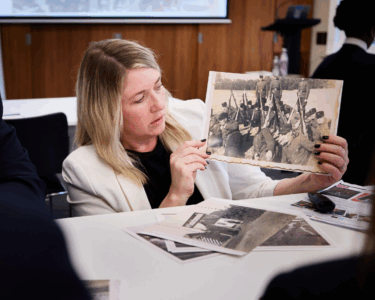‘Behind the scenes’ is a series of thought-provoking but accessible blog-style features that share some of the challenges members of our team experience when developing CPD sessions and classroom materials for teachers. The series incorporates insights and thought processes we have been unable to include, or explore fully, in our lesson plans. Our hope is that sharing the challenges we have faced will be interesting for teachers and lend further nuance and complexity to material being used in the classroom.
1. Striving to live: how did Jewish people respond and resist during the Holocaust?
27 February 2022 updated June 2022
By Emma Aoife O’Brien
This post may be of particular interest to teachers teaching the Centre’s two lessons, ‘Striving to live: how did Jewish people respond and resist during the Holocaust?’ or those using filmed survivor testimony in their classroom.
Working at the UCL Centre for Holocaust Education I am part of a team providing continuing professional development (CPD) in Holocaust education for teachers. We spend much of the time developing classroom material informed by the Centre’s research in addition to running sessions which model pedagogical approaches to support educators in teaching the material we devise.
Jewish resistance
For many years, a session on Jewish resistance was part of our original two-day CPD programme. Its inclusion was in response to our 2009 research which showed the topic to be one of those respondents might be least likely to include in a scheme of work on the Holocaust, and the session remained when the CPD later moved to a one-day offer.
When our 2016 research revealed that 56.1% of students aged 11-14 thought Hitler alone was solely responsible for the Holocaust, there developed a need to deal with this vital misunderstanding of how the ‘social act’ of genocide fundamentally happens. This prompted a revision of the content of the one-day CPD with the removal of the session Telling the story of resistance. Our new modular online offer, What was the Holocaust, how do I teach it and why does it matter? launched in September 2021, now includes the theme of resistance in our live online suite of eight Core CPD sessions with new and redeveloped material.
The Core CPD session and accompanying two classroom lessons, Striving to live: how did Jewish people respond and resist during the Holocaust? focus on the diverse responses of Jewish people during the Holocaust whilst also contemplating the challenges they faced. In the first lesson, wrestling with despair, grappling with the deception of the perpetrators and battling the determined attempt to destroy centuries of Jewish culture and history are explored. The concepts of ‘destruction’, ‘despair’ and ‘deception’ establish the structural elements of the lesson and attempt to convey the sheer, often insurmountable odds against survival faced by Jewish people.
Perpetrator narratives
When looking at the concept of deception, included in the material Striving to live: how did Jewish people respond and resist during the Holocaust? is the following quote which is revealed to students in three parts:
- In front of the building there were pots of geraniums and a sign saying “Hackenholt Foundation”, above which there was a Star of David. The building was brightly and pleasantly painted […]
- […] I do not believe that the people who had just arrived, had any idea of what would happen to them.
- Professor Wilhelm Pfannenstiel, Waffen-SS hygienist
This quote (in Klee, Dressen and Riess, 1998: 239) has featured in all our iterations of professional development sessions on resistance. Teachers, and subsequently their students, are encouraged to deconstruct it, line by line, until the awful truth of the deception is revealed – the quote refers to the gas chambers at the death camp Belzec. This activity has proven effective in teacher professional development sessions and demonstrates the deception employed by the perpetrators. How this deception took place is narrated by a perpetrator and with this in mind, when redeveloping the session on resistance, I wanted to include something from the survivors themselves in order to give them a voice about how the deception worked from their perspective.
Survivor accounts
An interview with the Holocaust survivor Rudolf Vrba (undertaken for The World at War TV series) features in Episode 20, Genocide 1941-45. The inclusion of his description of perpetrator deception seemed to be a perfect counter to the words of Pfannenstiel and so I included this filmed interview for teachers to play in the classroom and created a worksheet containing the interview transcript for students. The student worksheet contains the following verbatim extract from the episode:
Narrator: Some suspect the worst, most have no idea.
Vrba: The idea for a mother, being told after this terrible journey that her children were going to be gassed, was an utter outrageous idea in her mind. Because, after all what she suffered, here comes a gangster who wants to increase her suffering. So, she is tempted to go immediately to the next neat officer and say that, “This man says, sir, that my children are going to be gassed!” And he says, “Madam! Do you think we are barbarians?”
Narrator: Those selected to be gassed were told they would be deloused in the showers before starting work, then they would rejoin their families. They waited their turn, sometimes for hours.
To handle this oral history I needed to know more about how the extract had been edited for the documentary. The extract communicates the essence of how difficult it was for people to comprehend their own murder. Living in a post-Holocaust world, we know that humans are capable of building gas chambers to murder thousands at a time, whereas Vrba lived in a world where a crime like this had never been perpetrated – it was impossible for someone to imagine the unimaginable. The perpetrators also relied on the victims’ sense of what was civilised in order for their deception to be successful. That this horror was taking place in a modern, so-called civilised, Europe was inconceivable. Coming to this interview extract, I had initially thought Vrba was describing an incident where a mother had approached an SS officer – ‘a gangster’ – who had gloatingly told her what was about to happen and so she had gone to the next officer who had given her the reassurance she needed.
The context of this extract – not provided in the documentary – is crucial. Unlike perhaps more familiar Holocaust filmed testimony where a survivor gives an account of their life, White (2019: 144) notes that the interview questions for the documentary ‘were designed to elicit specific information that would be of most use in the documentary feature and, moreover, to generate responses that were sufficiently personal to provoke an emotional response in the viewer.’ White (ibid) continues,
For much of Rudolf Vrba’s interview, which is more than five hours long, his speech is impersonal, almost academic, and rarely does he recall events using personal pronouns. Vrba often rebuffs the interviewer’s attempts to ask personal questions, in some cases going as far as refusing to recount his personal experiences of an event, choosing instead to talk about the similar experiences of others.
In discussing Vrba’s interview, White (2019:144-145) explains that an attempt by the interviewer to elicit a ‘valuable’ response led to the following exchange as an immediate precursor to the words heard in the documentary:
Interviewer: Can I ask you … I mean, can I ask you a very direct question? You and people like you who were prisoners, you knew what was going to happen so why—what would have happened if you had warned them, and indeed why didn’t you warn them?
Rudolph Vrba: Because it was incredible for them to take … Don’t forget that by time we were prisoners we didn’t look like people whom they knew. For them, we were people dressed in criminals’ uniform, so if somebody went there and said, “Look you are going to be gassed” or something, …
Situated it in its fuller context, one can see the full import of what Vrba was saying. White (2019: 145) argues that ‘the targeted nature of the questioning produces a powerful, almost indignant response from him that offers a small window onto Vrba’s efforts to comprehend and make sense of an impossible situation.’ Vrba tries to explain why it would have been impossible for someone to comprehend information about their imminent demise and why he believed any warning he might have offered would have gone unheeded.
Once one knows what Vrba was asked during the interview, things become clearer. As White (2019: 144) notes, the interviewer is asking why didn’t he say anything? Why didn’t he warn people what was going to happen? Vrba’s response is a defence. Knowing that Vrba was trying to explain why he didn’t warn new arrivals of their impending murder, the additional context reveals the ‘gangster’ he speaks of is himself and not an SS officer. Under such brutal camp treatment, prisoners may have appeared to new arrivals like ‘criminals’ in prison uniform. In Vrba’s explanation the ‘gangster’ the woman would cast aside in disbelief is Vrba himself, whilst the notion of civilization is epitomized in a ‘neat officer’ who in reality is engaged in the barbaric crime he denies. Exploiting long-held values cultivated in a so-called civilised Europe, the complexity of deception involved is revealed; Vrba felt silenced, unable to warn of the awaiting horror (in another interview – the Claude Lanzmann Shoah Collection – Vrba recalls the shooting of a prisoner who tried to warn a mother recently arrived from Theresienstadt with her two children).
Implications for educators
The further context doesn’t change the notion that deception was a cruel and sophisticated tactic in which the perpetrators were schooled and a weapon which they wielded against their victims, but the additional information led to a set of questions for students to consider as they unpack what is being said in the interview.
In principle then, what issues relating to context might this raise for educators as we create classroom resources using filmed survivor testimony? Certainly it is important to consider our ethical responsibility towards the speaker and our students in communicating pertinent context. We need to be sure of the context when using filmed survivor testimony in order to comprehend what is being said and reflect on its significance.
Approaches in the initial stage of selecting filmed survivor testimony
When selecting testimony for use in the classroom, questions to explore could be:
- What has prompted the speaker to talk about the topic?
- What questions are they responding to?
- How has the interviewer positioned the conversation?
- What conversation precedes and follows the extract of choice?
Ensuring one has necessary context when selecting testimony may be more challenging if using material already edited for a documentary, but as this experience shows, uncovering more of the conversation led to a richer understanding of the history and reveals a depth of experience we might not have explored otherwise.
Teacher resources
The live online CPD session including the classroom material Striving to live: How did Jewish people respond and resist during the Holocaust? can be booked here:
https://holocausteducation.org.uk/core-cpd-courses/
A repository of filmed survivor testimony for use in the classroom can be found at the USC Shoah Foundation IWitness website: https://iwitness.usc.edu/home
IWitness guidelines for teaching with testimony can be found here:
https://iwitness.usc.edu/educatorresources
IWitness strategies for using testimony with students can be found here:
https://iwitness.usc.edu/educatorresources#resources
IWitness resources Using Visual History Testimony in the Classroom can be found here
IWitness offers a video tutorial Ethical Editing: A Workshop for Teachers Using Video Testimony in Classrooms which can be found on the dashboard of your Iwitness account when logged in. It covers basic principles regarding editing such as:
- Have you honoured the truth?
- Have you honoured the viewer?
- Have you respected the interviewee?
- How would they feel?
References
Klee, E., Dressen, W. and Riess, V. (Eds.) (1998). “The Good Old Days”. New York: Konecky & Konecky.
Lanzmann, C. (1978). Shoah Collection, Interview with Rudolph Vrba. New York. United States. FV3228: Clip 2 03:10:16:22 ‘Do you recall precise cases where people tried to warn the arriving?’ to 03:12:26:23 ‘… and that was the last we heard about him’. The Claude Lanzmann Shoah Collection is jointly owned by the United States Holocaust Memorial Museum and Yad Vashem. Sourced from USHMM: https://collections.ushmm.org/search/catalog/irn1004165
The World at War TV series. Episode 20 – ‘Genocide: 1941-1945’ (1974), FreemantleMedia International. Original version restored. Series Narrated by Sir Laurence Olivier, Series Producer Jeremy Isaacs, Historical Advisor Noble Frankland, music by Carl Davis. Episode written by Charles Bloomberg, produced and directed by Michael Darlow, narrated by Sir Laurence Olivier. Original TV transmission 27 March 1974. ©1973-74 Thames Television Ltd. Packaging Design © 2016 Network. Licensed by FreemantleMedia International.
White, M. (2019) ‘A Museological Approach to Collecting Oral Histories: A Case Study of the Holocaust Collections at the Imperial War Museum’. The Journal of Holocaust Research, 33:2, 138-156, DOI: 10.1080/25785648.2019.1598071
Acknowledgements
With thanks to Dr Andy Pearce, Dr Tom Haward and Programme Director, Ruth-Anne Lenga.



